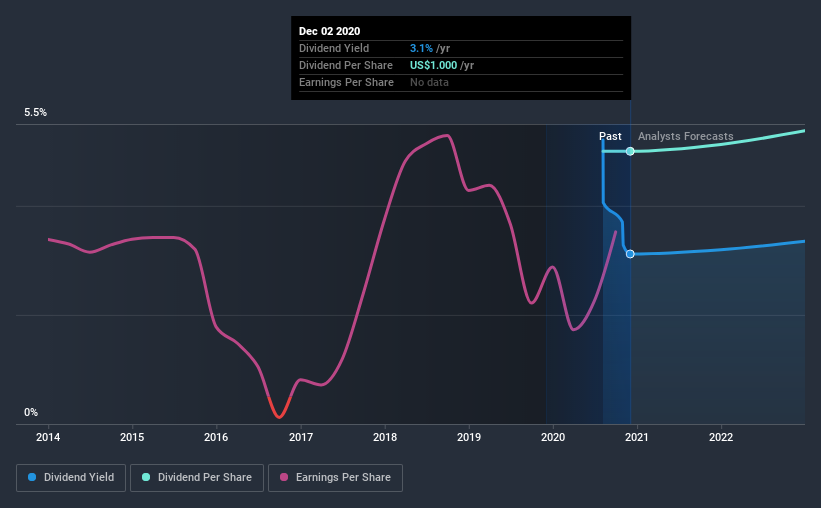Be Sure To Check Out CAI International, Inc. (NYSE:CAI) Before It Goes Ex-Dividend
Regular readers will know that we love our dividends at Simply Wall St, which is why it's exciting to see CAI International, Inc. (NYSE:CAI) is about to trade ex-dividend in the next 4 days. This means that investors who purchase shares on or after the 8th of December will not receive the dividend, which will be paid on the 24th of December.
The upcoming dividend for CAI International is US$0.25 per share. We love seeing companies pay a dividend, but it's also important to be sure that laying the golden eggs isn't going to kill our golden goose! That's why we should always check whether the dividend payments appear sustainable, and if the company is growing.
View our latest analysis for CAI International
Dividends are usually paid out of company profits, so if a company pays out more than it earned then its dividend is usually at greater risk of being cut. CAI International has a low and conservative payout ratio of just 8.3% of its income after tax. Yet cash flow is typically more important than profit for assessing dividend sustainability, so we should always check if the company generated enough cash to afford its dividend. What's good is that dividends were well covered by free cash flow, with the company paying out 9.3% of its cash flow last year.
It's encouraging to see that the dividend is covered by both profit and cash flow. This generally suggests the dividend is sustainable, as long as earnings don't drop precipitously.
Click here to see the company's payout ratio, plus analyst estimates of its future dividends.
Have Earnings And Dividends Been Growing?
Companies that aren't growing their earnings can still be valuable, but it is even more important to assess the sustainability of the dividend if it looks like the company will struggle to grow. Investors love dividends, so if earnings fall and the dividend is reduced, expect a stock to be sold off heavily at the same time. That explains why we're not overly excited about CAI International's flat earnings over the past five years. Better than seeing them fall off a cliff, for sure, but the best dividend stocks grow their earnings meaningfully over the long run. CAI International is retaining more than three-quarters of its earnings and has a history of generating some growth in earnings. We think this is a reasonable combination.
This is CAI International's first year of paying a dividend, so it doesn't have much of a history yet to compare to.
The Bottom Line
From a dividend perspective, should investors buy or avoid CAI International? The company has barely grown earnings per share over this time, but at least it's paying out a decently low percentage of its earnings and cashflow as dividends. This could suggest management is reinvesting in future growth opportunities. We would prefer to see earnings growing faster, but the best dividend stocks over the long term typically combine strong earnings per share growth with a low payout ratio, and CAI International is halfway there. It's a promising combination that should mark this company worthy of closer attention.
With that in mind, a critical part of thorough stock research is being aware of any risks that stock currently faces. For example, CAI International has 5 warning signs (and 1 which doesn't sit too well with us) we think you should know about.
A common investment mistake is buying the first interesting stock you see. Here you can find a list of promising dividend stocks with a greater than 2% yield and an upcoming dividend.
This article by Simply Wall St is general in nature. It does not constitute a recommendation to buy or sell any stock, and does not take account of your objectives, or your financial situation. We aim to bring you long-term focused analysis driven by fundamental data. Note that our analysis may not factor in the latest price-sensitive company announcements or qualitative material. Simply Wall St has no position in any stocks mentioned.
Have feedback on this article? Concerned about the content? Get in touch with us directly. Alternatively, email editorial-team@simplywallst.com.

 Yahoo Finance
Yahoo Finance 
